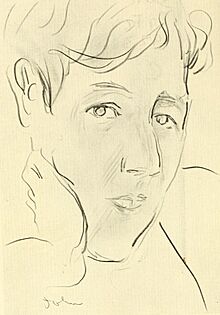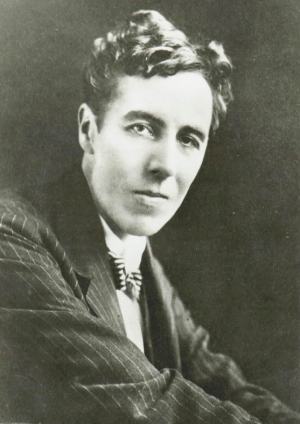Ronald Firbank facts for kids
Arthur Annesley Ronald Firbank (17 January 1886 – 21 May 1926) was an innovative English novelist. His eight short novels, partly inspired by the London aesthetes of the 1890s, especially Oscar Wilde, consist largely of dialogue, with references to religion and social-climbing.
Biography
Arthur Annesley Ronald Firbank was born on 17 January 1886, in Clarges Street, Westminster, the son of a member of parliament, Sir Thomas Firbank, and Lady Firbank, née Harriet Jane Garrett. He had an older brother, Joseph Sydney (born 1884), a younger brother, Hubert Somerset (born 1887), and a sister, Heather (born 1888). At the age of fourteen Firbank went briefly to Uppingham School (September 1900 to April 1901) and then on to Trinity Hall, Cambridge. He converted to Roman Catholicism in 1907. In 1909 he left Cambridge without taking a degree.
Living off his inheritance, he travelled around Spain, Italy, the Middle East, and North Africa. He died of lung disease in Rome, aged 40, and is buried in the Campo Verano cemetery.
Work

Firbank published his first story, "Odette d'Antrevernes", in 1905, before going up to Cambridge. He then produced a series of novels, from The Artificial Princess (written in 1915, published posthumously in 1934) and Vainglory (1915, his longest work) to Concerning the Eccentricities of Cardinal Pirelli (1926, also posthumous).
Inclinations (1916) is set mainly in Greece, where the fifteen-year-old Mabel Collins is travelling with her chaperone, Miss O'Brookomore. Mabel elopes with an Italian conte, but the plot is of minor importance and the interest, as with all Firbank's work, lies in the dialogue. His next novel Caprice followed in 1917.
Valmouth (1919) is based on the lives of various people in a health resort on the West Coast of England; most of the inhabitants are centenarians, and some are older ("the last time I went to the play...was with Charles the Second and Louise de Querouaille, to see Betterton play Shylock"). The inconsequential plot is concerned with the attempts of two elderly ladies, Mrs Hurstpierpoint and Mrs Thoroughfare, to marry off the heir to Hare-Hatch House, Captain Dick Thoroughfare. A musical comedy of 1958 by Sandy Wilson gave the novel some popularity in the 1960s, and has been revived several times and recorded on CD.
This was followed by a story, "Santal" (1921), that describes an Arab boy's search for God. In his next novel, The Flower Beneath The Foot (1923), the setting is an imaginary country somewhere in the Balkans. The characters include the King and Queen, sundry high-born ladies about the Court, and the usual attendant chorus of priests and nuns.
Sorrow in Sunlight (1924) was especially successful in America. It is set in a Caribbean republic (compounded of Cuba and Haiti). A socially ambitious black family move from their rural home to the capital, and the story is concerned with their attempts, which prove mainly abortive, to 'get into society'.
Firbank's play The Princess Zoubaroff (1920) has been compared to William Congreve, but is rarely produced. Dame Edith Evans played the title part in a radio production in 1964. The dialogue is highly characteristic: for example, Princess Zoubaroff says: "I am always disappointed with mountains. There are no mountains in the world as high as I would wish... They irritate me invariably. I should like to shake Switzerland."
Firbank's Complete Short Stories were published in 1990 in a single volume edited by Steven Moore, and his Complete Plays in 1991, with The Princess Zoubaroff, The Mauve Tower and A Disciple from the Country.
Ronald Firbank left among his manuscripts the first few chapters of a novel set in New York, The New Rythum (sic). These were published in 1962 after a sale of many of his manuscripts and letters.
Published works
Early publications
- "An Early Flemish Painter", in The Academy; 73 (28 September 1903), p. 948 (about Jan Gossaert)
- "La Princesse aux soleils, romance parlée ...(Trad. de l'anglais par l'auteur)", in Les Essais. Revue Mensuelle; II (November 1904), pp. 78–80
- "Harmonie ... (trad. de l'anglais par l'auteur)", in Les Essais. Revue Mensuelle; II (February 1905), pp. 305–06
- "Souvenir d'automne. A Poem in Prose". Supplement to The King and His Navy and Army; 21 (2 December 1905)
- Odette d'Antrevernes and A Study in Temperament (stories, Elkin Mathews, 1905)
- Odette d'Antevernes (1905, separate large-paper edition; reprinted by Grant Richards in 1916 as Odette: A Fairy Tale for Weary People, with four illustrations by Albert Buhrer)
- "The Wavering Disciple. A Fantasia", in Granta; 20 (24 November 1906), pp. 110–11 and 20 (5 December 1906), pp. 130–32
- "A Study in Opal", in Granta; 21 (2 November 1907)
Major works
- Vainglory ... with a frontispiece by Félicien Rops (novel, 1915)
- Inclinations ... with two drawings by Albert Rutherston (Rothenstein) (novel, 1916)
- Caprice ... with a frontispiece by Augustus John (novel, 1917)
- "Fantasia For Orchestra in F Sharp Minor", in Art and Letters; II N.S. (1919 Spring), p. 64-79; draft of a chapter of Valmouth (1919)
- Valmouth - A Romantic Novel ... with a frontispiece by Augustus John (novel, 1919)
- The Princess Zoubaroff - A Comedy ... with frontispiece and decoration by Michel Sevier (play, 1920)
- "Santal" (story, 1921)
- The Flower Beneath The Foot - Being a Record of the Early Life of St. Laura De Nazianzi and the Times in which She Lived ... with a decoration by C. R. W. Nevinson and portraits by Augustus John and Wyndham Lewis (novel, 1923)
- "A Broken Orchid" (from Sorrow in Sunlight), in The Reviewer; 4 (1923 October), p. 15-19
- Sorrow in Sunlight (novel, 1924)
- Concerning the Eccentricities of Cardinal Pirelli (novel, 1926)
Posthumous publications
- The Artificial Princess ... With an Introduction by Sir Coleridge Kennard (novel, 1934) [written c. 1915].
- The Complete Ronald Firbank, with a preface by Anthony Powell, (1961).
- "Lady Appledore's Mesalliance", in Cornhill Magazine; 172 (story, summer 1962), pp. 399–425 [written c. 1908].
- The New Rythum and Other Pieces (novel fragment, 1962) [incl. extracts from The Mauve Tower (play written c. 1904), A Disciple From The Country (play), "The Widow's Love" and "A Tragedy in Green"].
- The Wind & The Roses ... Introduction by Miriam J. Benkovitz, privately printed (poem, 1966)
- Ronald Firbank Far Away ... Note by Miriam J. Benkovitz (1966) [written 1904].
- Ronald Firbank - When Widows Love & A Tragedy in Green ... Introduced by Edward Martin Potoker (1980).
- Complete Short Stories. Edited with an afterword by Steven Moore (1990)
- Complete Plays. Edited with an introduction by Steven Moore (1994)
- Letters to his Mother: 1920-1924. Edited with an introduction by Anthony Hobson. (2001).


